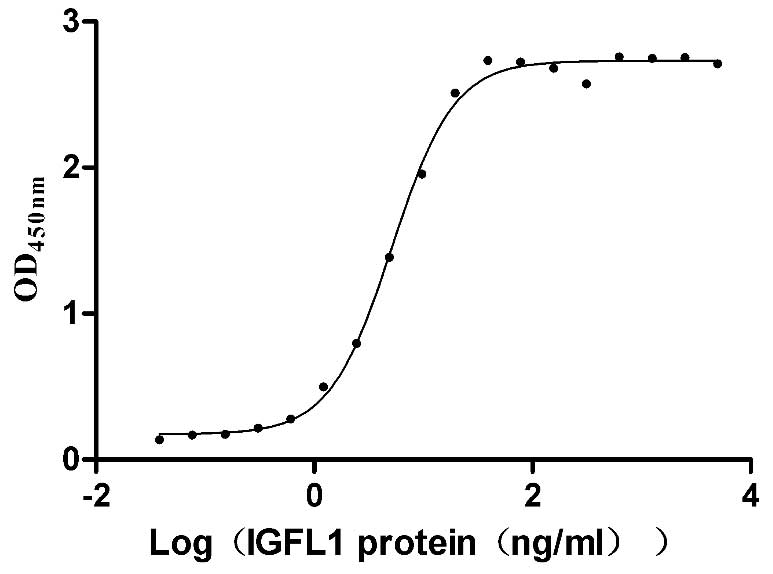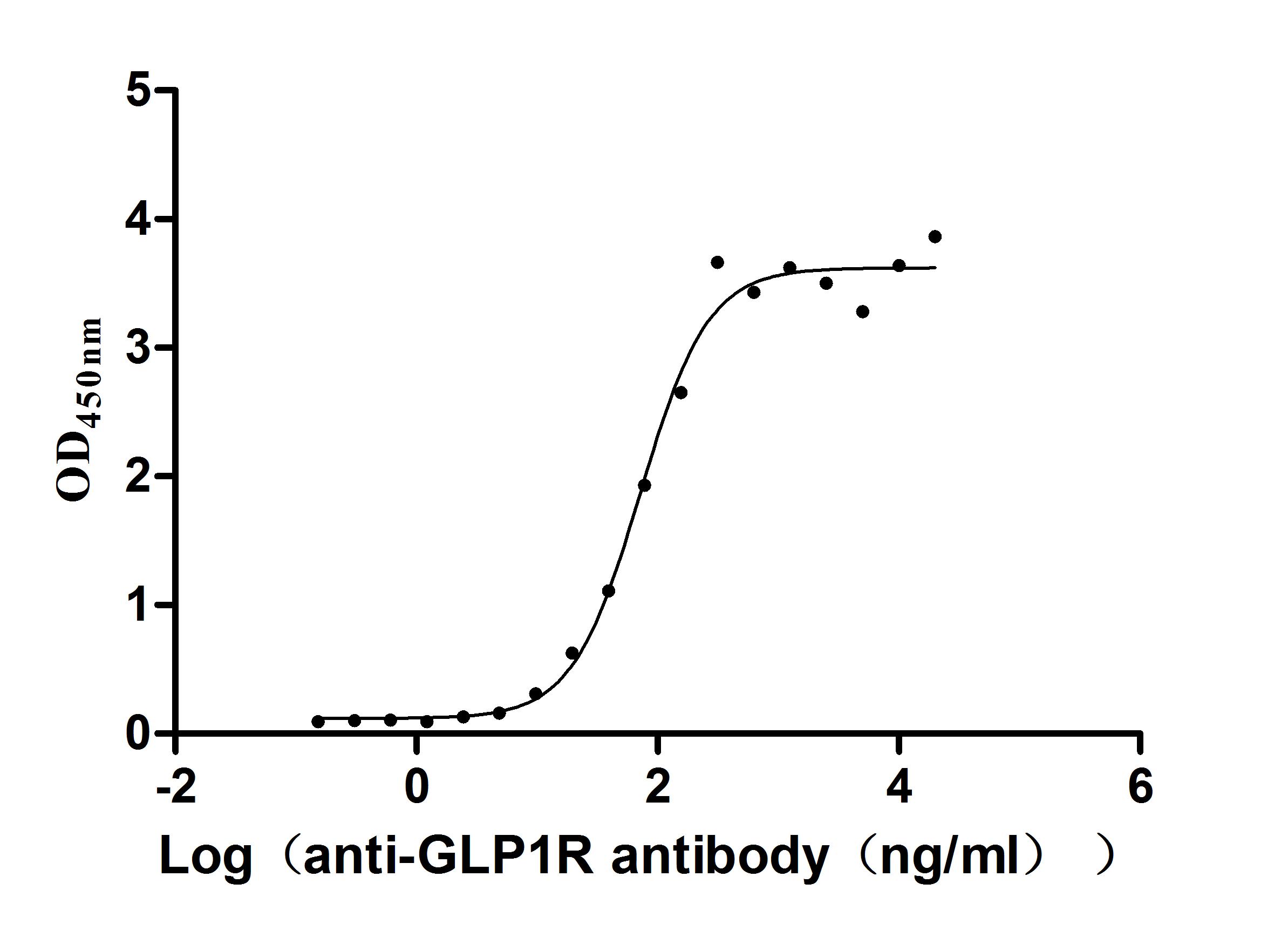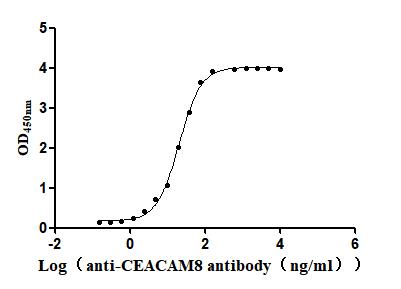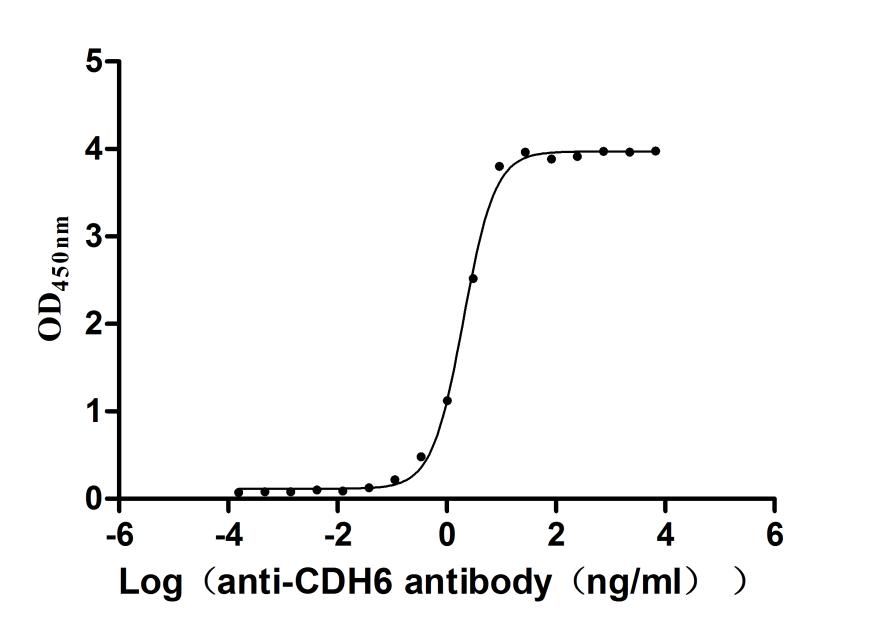Recombinant Escherichia coli Antitoxin MqsA (mqsA)
-
中文名稱:大腸桿菌mqsA重組蛋白
-
貨號:CSB-EP672732ENV-B
-
說明書:
-
規(guī)格:
-
來源:E.coli
-
共軛:Avi-tag Biotinylated
E. coli biotin ligase (BirA) is highly specific in covalently attaching biotin to the 15 amino acid AviTag peptide. This recombinant protein was biotinylated in vivo by AviTag-BirA technology, which method is BriA catalyzes amide linkage between the biotin and the specific lysine of the AviTag.
-
其他:
產品詳情
-
純度:>85% (SDS-PAGE)
-
基因名:mqsA
-
Uniprot No.:
-
別名:mqsA; ygiT; b3021; JW2989; Antitoxin MqsA
-
種屬:Escherichia coli (strain K12)
-
蛋白長度:full length protein
-
表達區(qū)域:1-131
-
氨基酸序列MKCPVCHQGE MVSGIKDIPY TFRGRKTVLK GIHGLYCVHC EESIMNKEES DAFMAQVKAF RASVNAETVA PEFIVKVRKK LSLTQKEASE IFGGGVNAFS RYEKGNAQPH PSTIKLLRVL DKHPELLNEI R
-
蛋白標簽:Tag?type?will?be?determined?during?the?manufacturing?process.
The tag type will be determined during production process. If you have specified tag type, please tell us and we will develop the specified tag preferentially. -
產品提供形式:Lyophilized powder
Note: We will preferentially ship the format that we have in stock, however, if you have any special requirement for the format, please remark your requirement when placing the order, we will prepare according to your demand. -
復溶:We recommend that this vial be briefly centrifuged prior to opening to bring the contents to the bottom. Please reconstitute protein in deionized sterile water to a concentration of 0.1-1.0 mg/mL.We recommend to add 5-50% of glycerol (final concentration) and aliquot for long-term storage at -20℃/-80℃. Our default final concentration of glycerol is 50%. Customers could use it as reference.
-
儲存條件:Store at -20°C/-80°C upon receipt, aliquoting is necessary for mutiple use. Avoid repeated freeze-thaw cycles.
-
保質期:The shelf life is related to many factors, storage state, buffer ingredients, storage temperature and the stability of the protein itself.
Generally, the shelf life of liquid form is 6 months at -20°C/-80°C. The shelf life of lyophilized form is 12 months at -20°C/-80°C. -
貨期:Delivery time may differ from different purchasing way or location, please kindly consult your local distributors for specific delivery time.Note: All of our proteins are default shipped with normal blue ice packs, if you request to ship with dry ice, please communicate with us in advance and extra fees will be charged.
-
注意事項:Repeated freezing and thawing is not recommended. Store working aliquots at 4°C for up to one week.
-
Datasheet :Please contact us to get it.
靶點詳情
-
功能:Antitoxin component of a type II toxin-antitoxin (TA) system. Labile antitoxin that binds to the MqsR mRNA interferase toxin and neutralizes its endoribonuclease activity. Overexpression prevents MqsR-mediated cessation of cell growth and inhibition of cell proliferation. Initially reported to act as a cotranscription factor with MqsA. Following further experiments, the MqsR-MqsA complex does not bind DNA and all reported data are actually due to a small fraction of free MqsA alone binding DNA. Addition of MqsR to a preformed MqsA-promoter DNA complex causes dissociation of the MqsA-DNA complex, probably causing derepression of MqsA-repressed transcripts. MqsA binds to 2 palindromes in the promoter region of the mqsRA operon activating its transcription. Binds to other promoters, inducing mcbR and spy and repressing cspD among others. Binds to and represses the rpoS promoter, the master stress regulator, resulting in decreased cyclic-di-GMP, reduced stress resistance, increased cell motility and decreased biofilm formation; in these experiments 5 TA systems are missing (lacks MazEF, RelEB, ChpB, YoeB-YefM, YafQ-DinJ). An earlier study showed overexpression alone increases biofilm formation, perhaps by repressing cspD; in these experiments the 5 TA systems are present. Represses the csgD promoter. In the presence of stress, when this protein is degraded, the promoters it represses are derepressed, leading to biofilm formation (Probable). This TA system mediates cell growth during bile acid deoxycholate stress by degrading mRNA for probable deoxycholate-binding protein YgiS; bile acid detergents such as deoxycholate are important for host defense against bacterial growth in the gall bladder and duodenum.
-
基因功能參考文獻:
- findings show that the cyclic AMP receptor protein (CRP) indirectly upregulates mqsRA transcription; also show that CRP plays an important role in antibiotic persistence, which seems to be partially mediated through MqsRA PMID: 26408451
- two well-defined domains of MqsA have almost identical structure in solution and in the two published crystal structures of dimeric MqsA bound to either MqsR or DNA PMID: 22789559
- Upon oxidative stress, MqsA is rapidly degraded by Lon protease, resulting in induction of rpoS; degradation of antitoxins during stress leads to a switch from the planktonic state (high motility) to the biofilm state (low motility). PMID: 21516113
- solvent content of the crystal was consistent with the presence of two MqsA molecules bound to the duplex DNA in the asymmetric unit PMID: 20823526
- Here, we report multiple individual and complex three-dimensional structures of MqsR and its antitoxin MqsA (B3021), which reveal that MqsR:MqsA form a novel toxin:antitoxin (TA) pair PMID: 20041169
顯示更多
收起更多
-
數據庫鏈接:
KEGG: ecj:JW2989
STRING: 316385.ECDH10B_3195
Most popular with customers
-
Recombinant Human IGF-like family receptor 1 (IGFLR1), partial (Active)
Express system: Mammalian cell
Species: Homo sapiens (Human)
-
Recombinant Mouse Retinol-binding protein 4 (Rbp4) (Active)
Express system: Mammalian cell
Species: Mus musculus (Mouse)
-
Recombinant Human Glucagon-like peptide 1 receptor (GLP1R), partial (Active)
Express system: Mammalian cell
Species: Homo sapiens (Human)
-
Recombinant Human Carcinoembryonic antigen-related cell adhesion molecule 8(CEACAM8) (Active)
Express system: Mammalian cell
Species: Homo sapiens (Human)
-
Recombinant Human Cadherin-6 (CDH6), partial (Active)
Express system: Mammalian cell
Species: Homo sapiens (Human)
-
Recombinant Mouse Cadherin-6 (Cdh6), partial (Active)
Express system: Mammalian cell
Species: Mus musculus (Mouse)

















